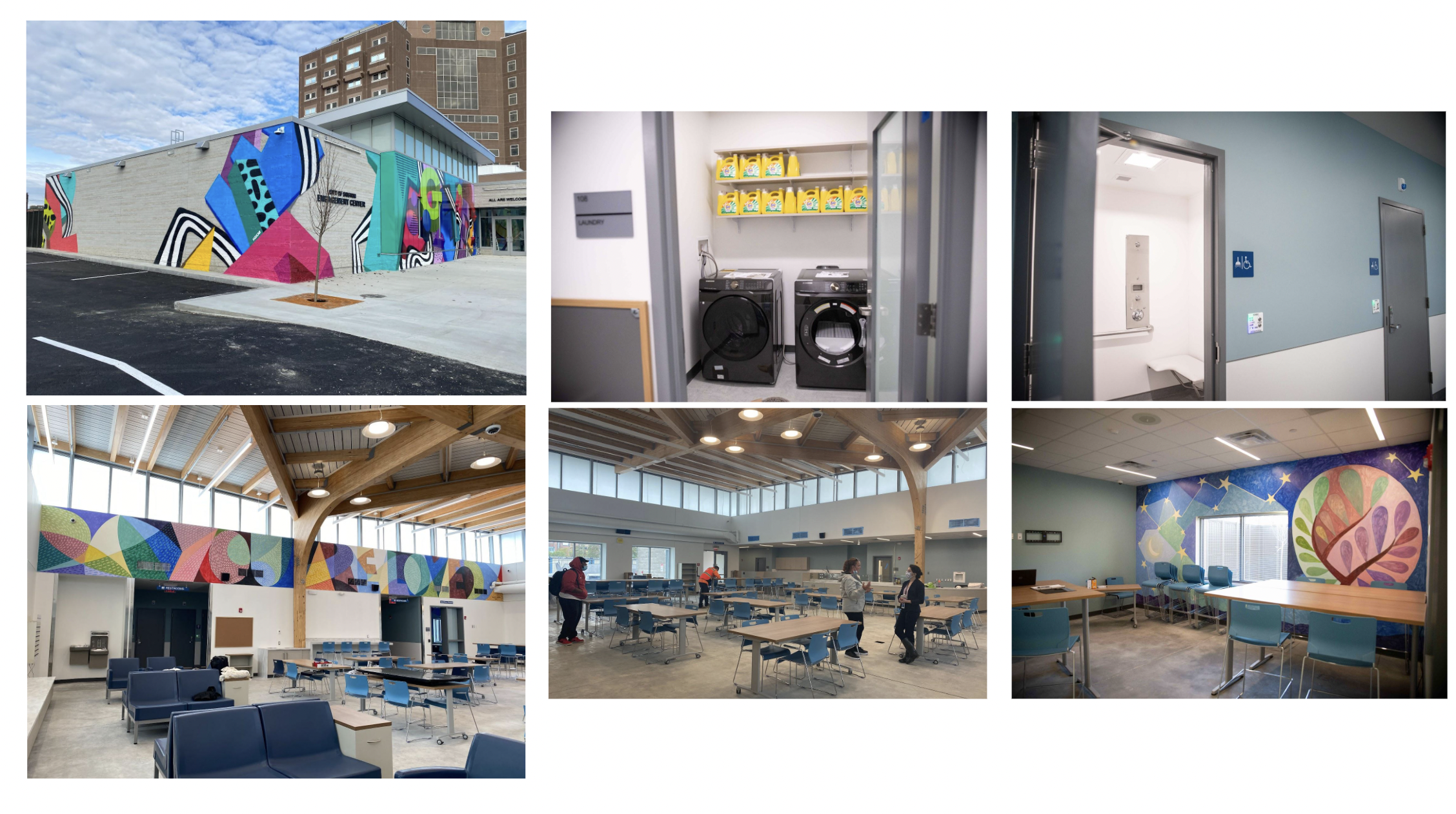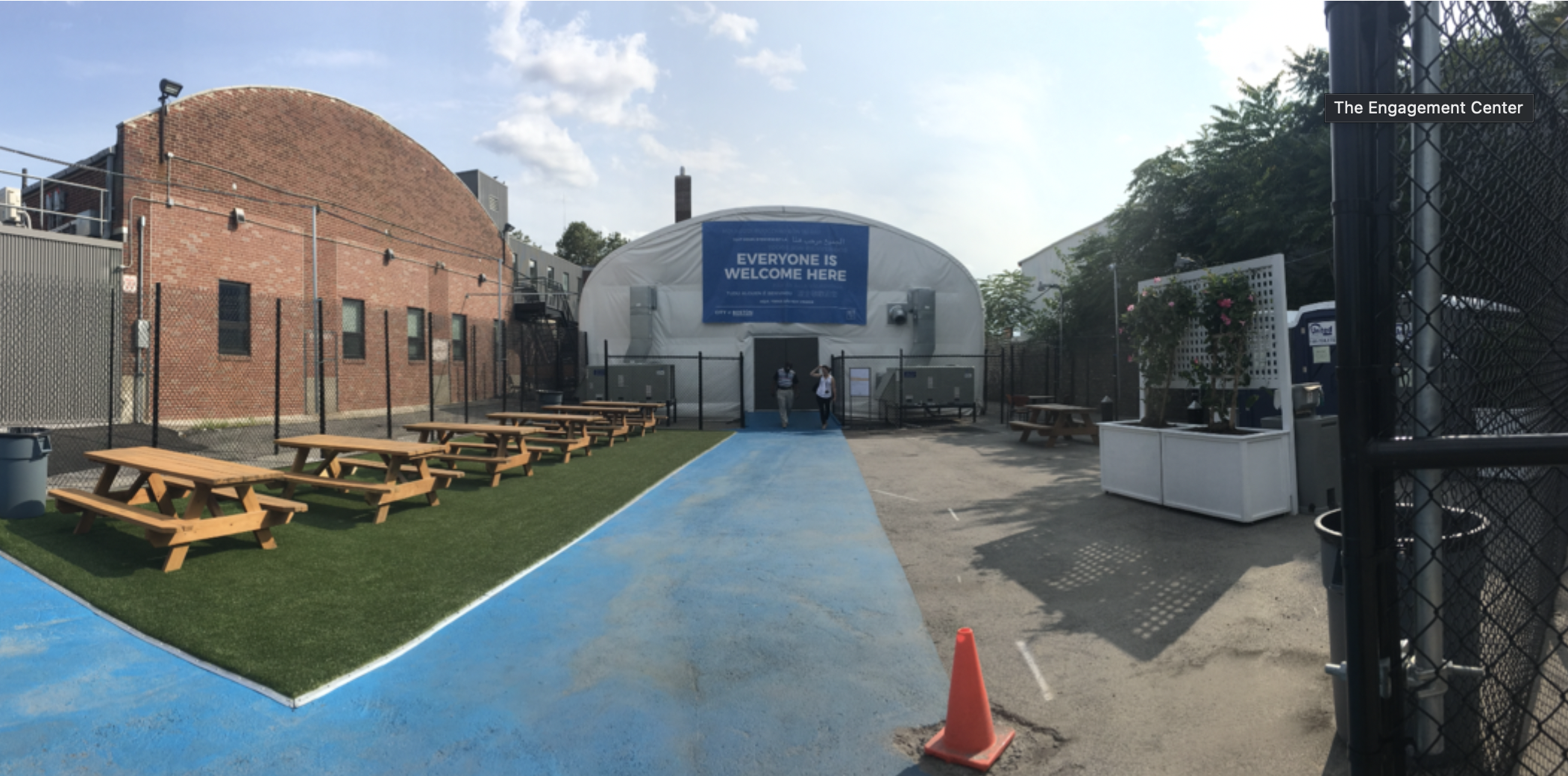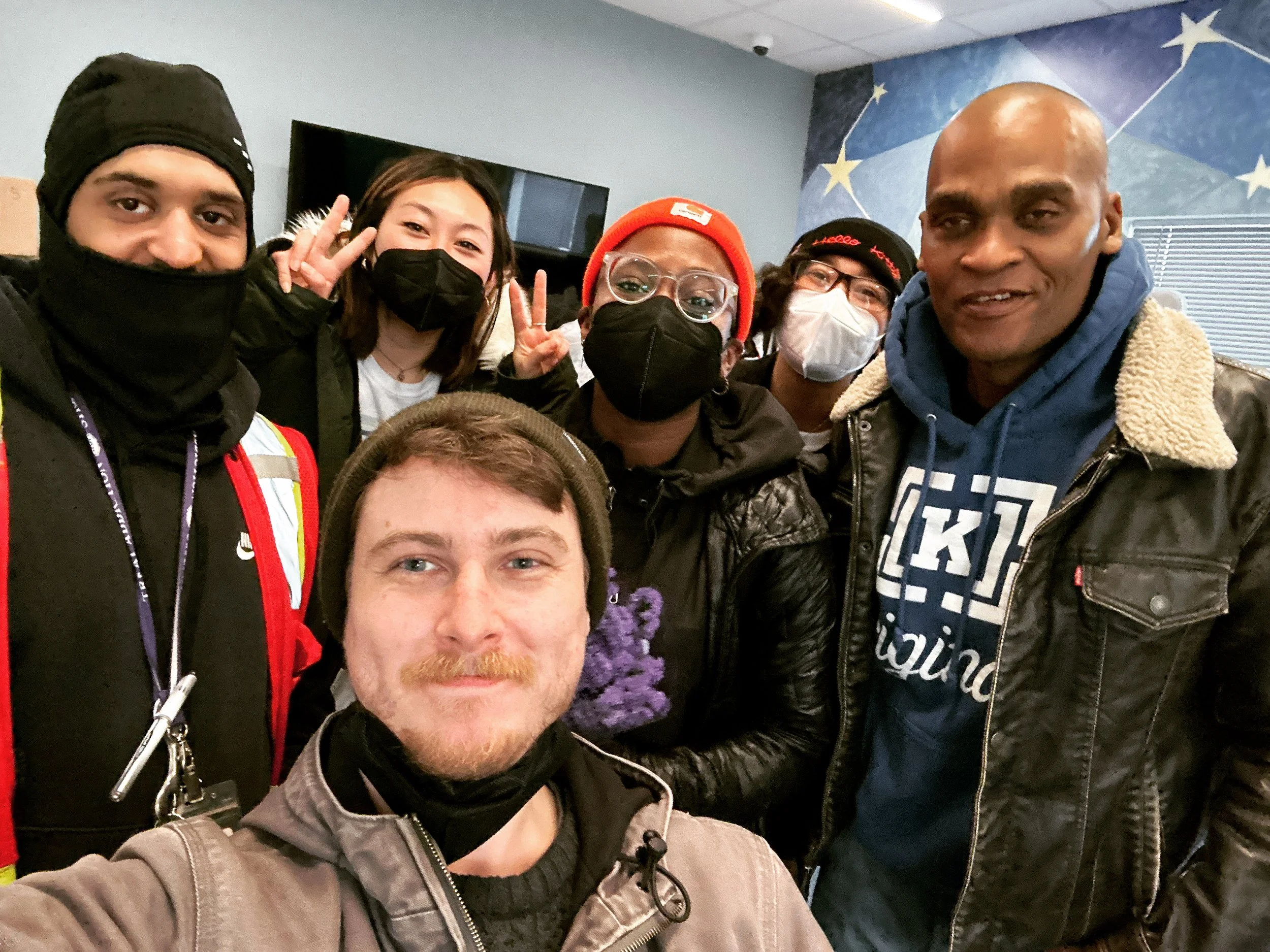Engagement Center
The new Engagement Center building, opened 2021.
The Call
Opened in August 2017, the Engagement Center (EC) is a welcoming, low-threshold daytime space for people navigating homelessness, substance use, and mental health challenges near the intersection of Boston’s Melnea Cass Blvd. and Mass Ave, often called in the media the “Methadone Mile.”
The “low-threshold model” improves access to care for people impacted by addiction by:
Lowering barriers to entry
Tailoring services to the needs of people who use drugs
Prioritizing trusted, caring staff
The goal of the EC is to provide a safe place for individuals to be during the day at the intersection of Mass and Cass.
While at the EC, folks are able to:
The EC has continuously worked with community partners to offer programming in the space that is responsive to guests interests and needs. We host writing workshops, art projects, yoga, and music programs.
In response to the feedback from guests we also piloted a monthly assistance program that allowed individuals to sign up for state IDs with the Mass RMV. This crucial resource is often a necessity for employment or enrollment in housing programs. For guests navigating legal challenges we host opportunities to check-in and understand their probation status.
Rest and connect
Access basic resources
Engage in recovery and homeless services
Receive nursing care and medical supports
Participants receive nursing care daily from Boston Health Care for the Homeless Program. They can also receive medical care, connect with a behavioral health provider, and start substance use disorder treatment.
A comprehensive guide to the design, implementation, and evaluation of the Engagement Center.
The Original EC
The Original EC converted in 2016-2017
The first iteration of the EC was a retrofit of an existing canvas structure in order to meet the urgency of the situation. This structure underwent multiple redesigns to meeting the changes needs of guests and staff.
In December 2021, the EC moved into a new $1.2m building at 26 Atkinson Street.
The new EC
In 2021, after 4 years of experimentation and learning with the initial space, a new building was codesigned with current and former guests.
This new space offers more access to:
Water, coffee, and light snacks
Restrooms and showers
Programming space for art, therapy and wellness services
TV, phone chargers, wifi and books
Computer and phone workstations available for email access, applications, and meeting with housing advocates, counselors, or recovery coaches
Upgraded nurse stations for medical care
Initial Impact (First 6 months)
Quantitative data from Boston Public Health Commission
Qualitative data from the Mayor’s Office of New Urban Mechanics
Experimental Programming:
The Me2 Orchestra playing at the original Engagement Center at Mass and Cass.
"The Me2 Orchestra is the world's only classical music organization created for individuals with mental illnesses and the people who support them." Learn more: me2music.org/
The People and Partners
Other initial partners included:
The Boston Public Health Commission Bureau of Recovery Services
Boston Public Health Commission Bureau of Homeless Services
Our staff are the guiding force for the Engagement Center. They ensure the space is welcoming and supportive.
Leaders — like our current director Leroy Ivey, the 2018 Henry L. Shattuck Public Service Award Recipient, and founding Director Mario Chaparro — bring their compassion and experience to making the space welcoming and innovative. Watch a feature about Mario.
Our Street Outreach Team operates within and around the Engagement Center. This group builds relationships with individuals by sharing information about resources, making referrals, and working to reduce barriers to care such as transportation. You can watch a feature about Chianta, former street outreach worker.
My Role
Check out this presentation for a comprehensive look at both my role and of the the larger design and implementation of this unique space:
The primary partnership of the Boston Public Health Commission and MONUM constantly worked to build additional partnerships and experiment with art, mental health, and wellness programming. Examples of this have been bringing Hands to Heart Yoga, Writers Without Margins, and the Me2 Orchestra to the space. As a part of the Mayor’s Office of Art and Culture’s Transformative Public Art program, curated by Street Theory, artist collective Mz. Icar created "Together" for the exterior of the spaces and local artist Alex Cook created four interior murals for staff and guests to enjoy.
In 2017, a team from the Mayor’s Office of New Urban Mechanics (MONUM), comprised of me, Sabrina Dorsainvil, and Susan Nguyen, led the initial design of the Engagement Center. We also assisted in providing funding, launching programming, and conducting community meetings with guests and staff to always be experimenting with the space. This continual experimention was, we believe, one of the principal ways that trust was built between guests and staff: that this place was not playing any tricks — the care was real.
Our team and partners conducted ongoing qualitative research and space improvements over time. This included an ethnographic research study by Blue Brick Ethnography and the renovation of our temporary space. The MONUM team engaged guests, staff, and the community in creative ways to imagine what the EC can be. This ongoing engagement shaped the design of the new EC building by SAAM Architects. The EC has shifted and grown thanks to MONUM’s commitment to imagination, reflection, and innovation.
Reflections + Design Philosophy
The early EC space became a beacon of possibility for creating a space that was safe, welcoming, connective and creative. Here are some of our early reflections that continue to guide this effort of creating low-threshold spaces and meeting people where they are:
→ Meeting people where they are in relation to SUDs
One of the hardest lessons, an elusive one to this date for some people working in this space, is recognizing that everyone is on their own journey and receptiveness to care. Gauging guests’ context remains a sensitive endeavor, one that requires daily openness, a recognition of trauma, and patience to address. We remain guided by Harm Reduction Principles in our effort to create a meaningful space.
→ Listening to guests and staff, always
We needed to be constantly mindful of the needs of guests and staff members, which coexist and collaborate closely in the EC. We intentionally devoted time to incorporate guests and staff feedback in the development of the space.
→ An external evaluation of our work
→ Inspiring future work
Every positive outcome was a nod to expand the mission and our learnings along the way guides us. In 2021, the City broke ground to provide a permanent physical space for the Engagement Center. These lessons also informed both long term planning and the exploration of low threshold overnight spaces.
More info on design, research, and larger context of the EC:
After the first 6-months of our pilot ended, we invited Blue Brick Ethnography to help us understand what specific needs were being met in the space and who was benefiting from its services. Listening to guests’ stories not only went a long way in acknowledging what we had accomplished but also in imagining what else the space could offer.
→ An experimental mindset rooted in care
The Engagement Center was one of the first daytime low-threshold spaces led by the City. We decided to approach this as an opportunity to experiment with expanded programming that included yoga classes, live music, barbers, an outdoor recreation area, plants, a library in collaboration with the BPL and much more.



















